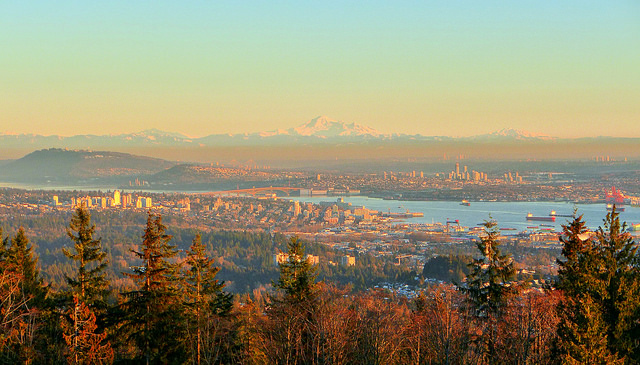Canada News
Air in Metro Vancouver starts to be cooler, fresher – report

FILE: Air Pollution in the boundary layer over Metro Vancouver on February 13, 2017 at 18:15 PST with Mt. Baker in background. (Photo by Andreas Christen/Flickr, CC BY-NC-ND 2.0)
The ‘transition’ to cleaner air in Metro Vancouver and the Fraser Valley started even though the air quality in those areas remained to be “quite poor” due to wildfire smoke, according to a Global News report on Thursday, August 23.
“After a very murky day yesterday, probably the smokiest of the stretch here on the Lower Mainland, things will slowly thin out [on Thursday],” Global News meteorologist Mark Madryga said.
But despite this, Madryga said widespread smoke is expected to remain, and that British Columbia (B.C.) Interior will still be “very smoky” on the weekend due to the wildfires.
“We’ll look for more clearing of the smoke [Friday] and certainly into the weekend as cooler air floods in, a westerly flow,” the meteorologist noted.
“That’s good news. It’ll be accompanied by a chance of showers on the weekend, though,” he added.
According to Environment and Climate Change (ECCC) Weather British Columbia, the air quality health index (AQHI) improved across the South Coast, particularly in areas near the water “where a ‘marine push’ has brought much needed fresh Pacific Air.”
The ECCC showed that most communities in Vancouver Island — including Metro Vancouver — got an AQHI index readings of 10+ or a “very high” health risk on Wednesday, August 22.
However, on Thursday, it dropped by 6, 4, 7, and 6 points in Metro Vancouver Northeast, Northwest, Southeast, and Southwest, respectively.
In a report by Global News in August 2017, the head of respiratory medicine at St. Paul’s Hospital, Dr. Don Sin, expressed his concern that the air quality in some parts of Metro Vancouver was worse than Beijing’s.
“So right now, Beijing air is better in terms of quality than Vancouver air,” he said.
“That’s very rare. Most of the time we beat Beijing hands down. But over the next few days I’m afraid the quality of air in Beijing will be better,” he continued.
He warned that if similar wildfires become “an annual theme with long periods of poor air quality,” it could turn into a significant health risk.
“We experienced something similar a couple summers ago. So it’s not that infrequent now, and global warming obviously is contributing to this. People in British Columbia should not be alarmed necessarily, but should be vigilant,” Sin said.

